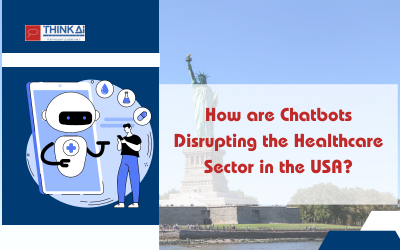AI-powered chatbots have become extremely popular in all sectors of the world. However, regarding the healthcare sector, chatbots have elevated the availability of healthcare for people and have provided innovative solutions to deal with different challenges prevalent within the healthcare sector. This blog elaborates on how these chatbot services have impacted the healthcare sector in the USA.
Engaging with patients
Companies often use AI-powered chatbot services to enhance their customer service. Similarly, in the healthcare sector, chatbot services have made patient engagement practices extremely easy. The prevalence of chatbot services has made scheduling appointments easier for patients. Healthcare institutions rely upon chatbots to assist patients so that they can schedule appointments with the healthcare professionals within the institution.
Furthermore, with the help of chatbot services, patients can also seek reminders regarding their appointments with the healthcare institution.
In addition to this, chatbots have also enhanced the availability of health information. Healthcare institutions rely upon chatbots to transmit necessary details, reminders, and healthcare tips to patients. This has innovatively changed the healthcare sector in the USA as it demonstrates the development of a proactive management system and helps the healthcare sector promote health literacy among the country’s people.
Mental Health Support
Chatbot services for healthcare have also enhanced the mental health support prevalent within the country. With the help of chatbot services, healthcare institutions have been able to have a stronger connection with their patients. Patients can contact these AI-powered chatbot services for therapeutic conversations and seek emotional or mental support during difficult times. With the help of these chatbot services, the mental health support system has completely innovated itself. This includes providing personalized support so that patients can deal with day-to-day challenges such as anxiety, hypotension, stress, and other mental health concerns. In addition, these chatbot services also allow healthcare professionals to monitor these patients’ overall mental health metrics.
By seeking therapeutic support through a chatbot, the patients can connect with the chatbot and seek personalized support. However, this practice also allows healthcare professionals to keep track of their mental health metrics and monitor the overall mental well-being of their patients. This also allows them to diagnose patients and provide them with the best possible care regarding their ailments.
Health tracking
In alignment with mental healthcare monitoring, chatbot services for healthcare also allow healthcare professionals to track their patients’ well-being in other aspects. Chatbots help collect data on the patients by asking them different questions about their issues. This allows healthcare professionals to access specific information regarding the patient’s lifestyle and the symptoms they are facing.
This makes the diagnosis extremely prompt and enables the professional to provide a proper treatment plan to make the patients feel better. This also goes hand in hand with wellness tracking. Chatbot services can help track wellness by providing personalized daily health and nutrition tips. These tips could include exercises, diet plans, daily routines, etc. With the help of chatbot services, healthcare professionals can track the wellness of their patients and ensure that they lead a healthier lifestyle.
Embracing diversity
With the development of technology, chatbots also aid in catering to diverse patients. AI-powered chatbot services are mainly responsible for engaging patients to seek information and help them set up appointments. With the help of these chatbot services and their multilingual support, patients from all walks of life and cultural backgrounds can seek healthcare support in the USA. Chatbot services for healthcare embrace diversity and ensure that multilingual support allows the diverse population to feel accepted and cared for.
Reducing Administrative Burden
Finally, one of the most prominent challenges within the healthcare sector in the USA was the administrative burden. Families of patients have several queries when it comes to insurance and billing. It is only sometimes possible for the executive department of healthcare institutions to provide detailed information about these queries. By relying upon AI-powered chatbot services, the healthcare sector of the USA has benefited as they can answer all the insurance queries that patients and their families might have.
With the help of these chatbot services, patients and their families have gained access to basic insurance-related information. In addition, chatbots have also answered any queries that the patients and their families might have regarding billing. This has considerably reduced the healthcare sector’s overall administrative burden and made the overall patient experience smooth sailing.
Conclusion
AI-powered chatbot services have played an integral role in all business sectors around the globe. However, healthcare chatbots have ensured that they embrace diversity by catering to a diverse population. This has elevated the quality of healthcare in the USA and regained the general public’s trust regarding the healthcare system prevalent within the country.

